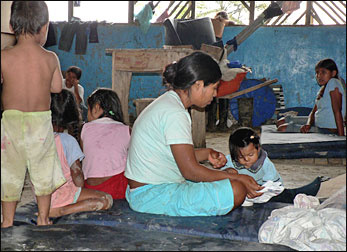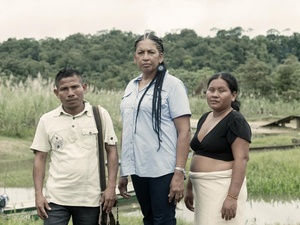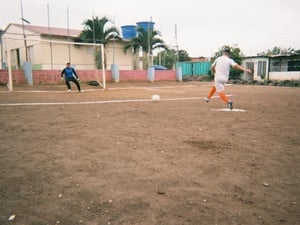Colombia's Pearl of the Pacific loses its lustre
Colombia's Pearl of the Pacific loses its lustre

A sea view of Tumaco, main part of Nariño department.
TUMACO, Colombia, December 10 (UNHCR) - Life in Tumaco was never easy for Jorge*, who arrived in the Pacific port city after fleeing violence in another part of Colombia a few years ago.
It may be dubbed the "Pearl of the Pacific" by locals, but the truth is that Tumaco has become a tough and unattractive place to settle in - even for the desperate. The population is largely Afro-Colombian and most of them live in dire poverty, but Jorge never thought life would get so bad that he would have to leave.
"I am not going to run away; they won't make me do it, not this time," he told UNHCR last month. Only days later, Jorge changed his mind and went into hiding after he found a handwritten death threat on his kitchen table.
"You know who we are," the message said, "and you know that you cannot mess with us. We are going to kill you because you refused to cooperate."
In previous weeks, members of a newly formed local armed group had put pressure on Jorge to hand over the food parcels he helped distribute in the community. The group claimed they alone had the right to decide who should receive the food since they were in charge of "social control" in the area.
Jorge knew he had no choice: if he did not flee, he would become one more victim in the wave of murders committed by such armed groups in recent months. Warning about the rise in targeted killings, the local church last week published a list of 101 people murdered in Tumaco in the past three months alone.
"Unfortunately, we have become used to hearing every day, including from the authorities in charge, expressions that try to justify or pass over these deaths," said Bishop of Tumaco Gustavo Girón Higuita, who signed the communiqué.
According to statistics from the Observatorio del Delito, an official crime monitoring body, 260 people were murdered during the first nine months of this year in the Tumaco area, which numbers some 160,000 people in urban and rural zones. This represents a yearly average of 200 homicides per 100,000 people, far above the national figure of 38 murders per 100,000 inhabitants in 2006.
Calling on the armed forces to protect the life of all civilians, Bishop Higuita said the deteriorating situation in Tumaco was evidence of what he called the "fading away of the hopes that arose with the demobilization process." He was referring to the national process of paramilitary demobilization that began in 2004.
Jean-Noël Wetterwald, the UNHCR representative in Colombia, also expressed concern about the situation and the possibility of more forced displacement. He said that displaced people, who often live in very poor and marginal urban areas, were especially vulnerable to violence from irregular armed groups.
Local organizations and authorities report a marked increase in threats to leaders of displaced populations in Tumaco since the start of the year. They say the known cases could be only the tip of the iceberg, since many victims are too scared to speak. "Talking to us can lead to more persecution and to retribution," said one local human rights worker.
Tumaco is the main Pacific Ocean port in south-west Colombia's volatile Nariño department. The region is an epicentre of combat between the national armed forces, irregular armed groups and criminal gangs involved in the trafficking of cocaine. Since the start of the year, there have been 27 instances of mass forced displacement in Nariño, involving more than 15,000 people.

More than 15,000 people have been forced to flee violence in Nariño since the start of the year.
As a result, Tumaco is home to thousands of displaced people seeking the relative safety of the city. It also provides shelter of a sort to people fleeing violence in Buenaventura, another Pacific port city to the north that has the worst indices of violence in Colombia.
According to government figures, an average of 200,000 people are forced to flee their homes every year in Colombia as a result of armed conflict between the state and irregular armed groups.
* Name changed for protection reasons
By Marie-Hélène Verney in Tumaco, Colombia









